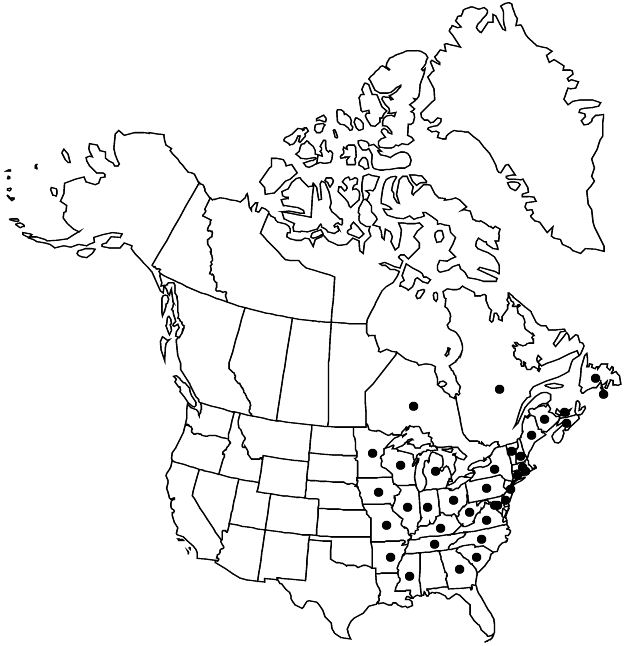Difference between revisions of "Viola cucullata"
Hort. Kew. 3: 288. 1789.
FNA>Volume Importer |
imported>Volume Importer |
||
| (One intermediate revision by the same user not shown) | |||
| Line 75: | Line 75: | ||
|publication year=1789 | |publication year=1789 | ||
|special status=Endemic | |special status=Endemic | ||
| − | |source xml=https:// | + | |source xml=https://bitbucket.org/aafc-mbb/fna-data-curation/src/2e0870ddd59836b60bcf96646a41e87ea5a5943a/coarse_grained_fna_xml/V6/V6_213.xml |
|genus=Viola | |genus=Viola | ||
|species=Viola cucullata | |species=Viola cucullata | ||
Latest revision as of 22:19, 5 November 2020
Plants perennial, acaulescent, not stoloniferous, 5–20 cm; rhizome thick, fleshy. Leaves basal, 4–8, ascending to erect; stipules linear-lanceolate, margins entire, apex acute; petiole 6–20 cm, usually glabrous; blade unlobed, ovate to reniform, 1.5–11 × 1–9 cm, base reniform to cordate, margins crenate to serrate, ciliate, apex acute or obtuse to slightly caudate, surfaces glabrous, rarely pubescent. Peduncles 7–25 cm, glabrous or pubescent. Flowers: sepals lanceolate, margins ciliate or eciliate, auricles 3–6 mm; petals light to dark blue-violet to violet on both surfaces, upper 2 and lateral 2 darker basally, lateral 2 densely bearded, lowest white basally, dark purple-veined, 9–13 mm, spur color same as petals, gibbous, 2–3 mm; style head beardless; cleistogamous flowers on erect peduncles. Capsules ellipsoid to ± ovoid, 10–15 mm, glabrous. Seeds beige, mottled to bronze, 1–2 mm. 2n = 54.
Phenology: Flowering Apr–Jun.
Habitat: Open or wooded wet areas, seeps, springs, swamps, marshes, streamsides
Elevation: 0–2000 m
Distribution

St. Pierre and Miquelon, N.B., Nfld. and Labr. (Nfld.), N.S., Ont., P.E.I., Que., Ark., Conn., Del., D.C., Ga., Ill., Ind., Iowa, Ky., Maine, Md., Mass., Mich., Minn., Miss., Mo., N.H., N.J., N.Y., N.C., Ohio, Pa., R.I., S.C., Tenn., Vt., Va., W.Va., Wis.
Discussion
Viola cucullata reportedly hybridizes with V. sororia (= V. ×bissellii House), V. brittoniana (= V. ×notabilis E. P. Bicknell), and V. sagittata var. sagittata (= V. ×porteriana House).
Selected References
None.